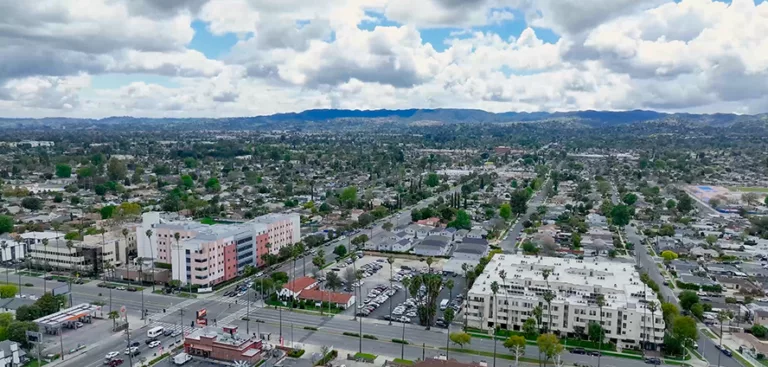Vibrant Lifestyles Meet Quality Care at Los Angeles Jewish Health


Vibrant Lifestyles Meet Quality Care at Los Angeles Jewish Health

For more than a century, Los Angeles Jewish Health (formerly Los Angeles Jewish Home) has cared for older adults with compassion, respect, and high-quality programs, services, and senior living options.
At Los Angeles Jewish Health, the art and science of caring for older adults has been cultivated over 100 years of service, earning the organization a second-to-none reputation in the region.
“One of the many things that stands out about our organization is our collaborative approach,” says Noah Marco, M.D., chief medical officer. “Throughout our history, we have emphasized the importance of bringing various professionals and specialists together to collaborate, communicate, and cooperate on behalf of each patient. We also maintain excellent relationships with the area’s leading hospitals and medical centers.”
Founded in 1912, Los Angeles Jewish Health has grown from a group of caring neighbors to a leading nonprofit organization, open to all, built on the Jewish values of charity, quality, dignity, and fiscal responsibility.
Compassion is at the core of every interaction, and a family approach permeates the culture.
“We treat residents like family, and we also consider our staff one big family. Together, we work for the safety, health, and well-being of the individuals in our care,” says Dr. Marco. “Every member of our team—from medical providers, pharmacists, and social workers to drivers, housekeepers, and maintenance staff—is enthusiastically dedicated to living our organization’s mission of serving and honoring older adults.”
With multiple locations and several levels of care within the Los Angeles Jewish Health network, head-to-toe services are provided—from primary care to physical therapy, dental, ophthalmology, optometry, dermatology, podiatry, and more.
Working as coordinated care teams ensures the best care is provided to the whole patient—mind, body, and spirit. This patient-centered model also mitigates the challenges of visiting several providers at multiple locations over weeks—a mental and logistical burden that often falls to a patient’s children or grandchildren.

Levels of Care
To support seniors in maintaining healthy outcomes throughout their aging journey, Los Angeles Jewish Health offers a broad array of programs and services, including independent living, assisted living, senior behavioral health, short-term rehabilitation, skilled nursing, memory services, and hospice and palliative care.
The Brandman Centers for Senior Care offers comprehensive adult day services through their PACE program (Programs of All-Inclusive Care for the Elderly). This award-winning program allows more frail seniors to remain independent in their homes while receiving vital care and social services at their neighborhood location and offers transportation, home care, engaging activities, and medical care.
“PACE is designed to care for historically underserved populations who have complex medical and psychosocial conditions,” says Dr. Marco. “Our participant feedback shows high scores of satisfaction, particularly in the clinical services and the delicious meals we provide. Recognized as a top performer in this space, we are continually focused on expanding these services to more seniors in need.”
Caring Choices in Independent and Assisted Living
For active older adults interested in a continuing care retirement community, Los Angeles Jewish Health offers independent living accommodations.
For residents in the San Fernando Valley, Fountainview at Eisenberg Village in Reseda, California, features resort-style living with gourmet dining, an on-site movie theater, a bar/lounge, a state-of-the-art fitness facility, and a creative arts studio. A full-service staff provides expert care and attention to 108 independent living options, with optional nursing and care available.
Patient-Centered Telemedicine
With support from a grant from the Federal Communications Commission and generous donors, Los Angeles Jewish Health has invested heavily in state-of-the-art technology, including telemedicine, to expand its mission of patient-centered care.
Dr. Marco explains that standard healthcare has predominately been a physician-centered model, wherein patients must travel to the physician at the physician’s convenience. But in a patient-centered telemedicine approach, patients are seen in the comfort of their own home.
“When done correctly, telemedicine has incredibly high satisfaction rates. Providers can instantly look at and listen to a patient, and if a nurse is present with the patient, even use a stethoscope to listen to the heart and lungs. The data clearly shows that physicians are able to make diagnoses quickly and more accurately,” Dr. Marco says.
Effective telemedicine also reduces instances of unnecessary ambulance calls, which are costly and disruptive for patients, families, and caretakers alike.
Personalized Approach
With the benefit of expert gerontologists at the helm, Los Angeles Jewish Health focuses on the five M’s of geriatric care: mind, mobility, medications, multiple complexities, and what matters most to you.
“These five M’s are the difference between our tailored geriatric practice and a standard, fractionated approach to care,” says Dr. Marco. “We hyperfocus on learning each patient’s goals and needs so that their care can be as personal and effective as possible.
This article first appeared in Good Housekeeping and Woman's Day magazines in their January/February 2024 issue.
